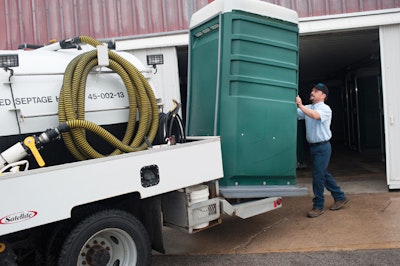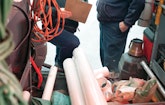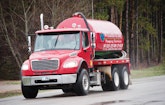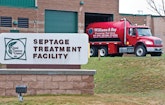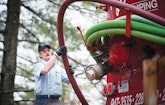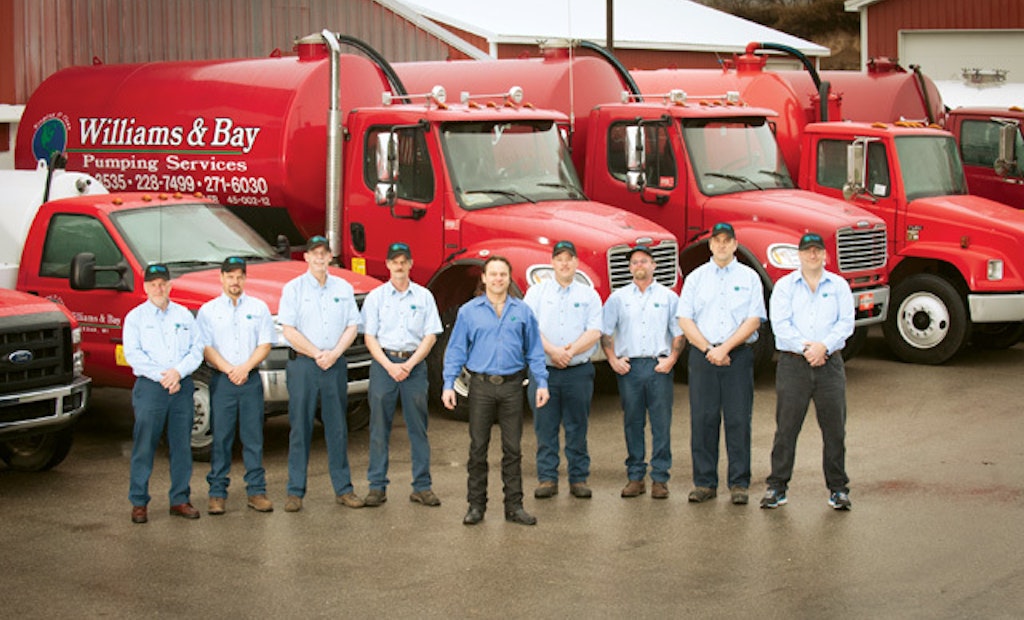
Interested in Portable Sanitation?
Get Portable Sanitation articles, news and videos right in your inbox! Sign up now.
Portable Sanitation + Get AlertsEducation – first for himself, then his customers – provided the key for Joe Williams to expand his business and put Williams & Bay Pumping Services of Cedar, Mich., in a comfortable position when the economy stalled in late 2008.
Williams gained much of his business savvy the hard way, learning from experience, then modifying operations accordingly. A major turning point occurred in 2006 when he bought out Bay Pumping and hired owner Dennis Fehrenbach as superintendent. He also hired Jerry Endres as his office manager. The two men freed Williams to work on his business instead of in it. Revenues nearly doubled before the economy soured.
State and federal regulations have presented their own learning curves and business challenges. Williams adapted by joining the Michigan Septic Tank Association, a group of pumpers trying to do things right before legislation changed the laws. Williams noticed that the longer some pumpers resisted change, the farther behind they fell. He decided to emulate those who embraced change and planned for it, because they prospered.
THE FAMILY BUSINESS
Williams, 45, bought the company from his father, Ron, in 1993. “Dad’s service area was 10 to 15 miles from home, but I never said no to anybody,” Williams says. Joe Williams gradually expanded into three neighboring counties and diversified into portable sanitation.
Pumping was Ron Williams’ unexpected second career after the factory in which he worked went bankrupt. At age 52, he bought a dump truck and tank, then had a friend cut and weld them into a septic truck. “Traverse City had two or three septic companies and they were driving 20 or 30 miles into Leelanau County,” Williams says. “With only one other pumper at the other end of it, Dad figured he’d find enough customers.”
Joe and brother Greg, both teenage entrepreneurs, picked up the slack when the elder Williams wanted to retire. Ron, now 79, spends time helping Greg on his commercial cherry and apple orchards.
From one old truck and a few accounts, Williams increased business to where, in 2010, the company pumped nearly 5 million gallons and land-applied 1.7 million gallons.
To transport septage, Williams prefers Freightliner M-106 service rigs. His newest is a 2010 model with a 5,200-gallon aluminum tank and National Vacuum Equipment 607 pump from Imperial Industries Inc. He has a pair of 2007 M-106s with 3,300-gallon steel tanks and Max Pack pumping system distributed by NVE, from Marsh Industrial Inc.
On the portable sanitation side, Williams runs 2007 and 2008 Ford F-550s from Satellite Industries Inc. with 650-gallon waste/300-gallon freshwater steel tanks and Conde 6 pumps. His restroom inventory includes 300 units: 50 percent Tuff Jons from T.S.F. Company Inc., 30 percent High Tech units from Satellite, and 20 percent Fleet models with hand-wash units from PolyJohn Enterprises Corp.
GRAND TRAVERSE PLANT
When Joe Williams took over the business, he continued a practice of spreading untreated septage on agricultural land. Septage disposal, however, has changed as the Michigan Department of Environmental Quality incorporated U.S. Environmental Protection Agency regulations, then added language to discourage land application.
“First, we had to discharge at a treatment plant if we were within 15 road miles of it,” Williams says. “In 2005, the distance expanded to 15 radial miles. In 2010, it increased to 25 radial miles.”
Grand Traverse County townships took the regulations a step further. In 2005, they passed the Uniform Septage Control Ordinance requiring septage generated in the county to be discharged at the Grand Traverse County Septage Treatment Facility. “The plant was supposed to pay for itself with discharge fees, but the business plan was based on faulty projections,” Williams says. “The facility was supposed to receive some 12 million gallons per year, and it’s only getting about six.”
The restrictions forced fee increases and bigger pumping bills. Annual truck licensing fees rose from $25 to $480. When pumpers passed along cost increases to consumers, resentment erupted as a $150 pump-out became a $350 or $400 charge. Williams combated their misconceptions by asking customers to compare monthly cable bills to the cost of a pump-out averaged over three years. It came to $10 or $11 per month compared with $50 or more for cable. Once consumers put the cost into perspective, they viewed the service as affordable.
LAND APPLICATION RULES
The treatment plant charges 12 cents per gallon and has proposed raising rates to 18 cents per gallon by 2013. Williams charges six cents per gallon and saves customers $60 to $100 per pump-out when land-applying the treated waste. Last year, he installed 52,000 gallons of holding tank capacity, enabling him to land-apply through 2025. Retaining his land application license, however, was another turning point.
“I avoided regulators until I joined MSTA in 2002,” he says. “Networking with people changed my outlook and I began asking regulators questions. As they educated me, I realized that pumpers must educate themselves on how to do things compliantly, then educate their customers.”
To prepare for the 2005 land application regulations, Williams upgraded his operation to discharge septage through 3/8-inch screens. He bought a tractor and a 3,800-gallon Husky Farm Equipment manure tank with a four-shank injection system, then learned how to test soil and decide which crops to grow.
“Today, we utilize a cropping plan for each farm, broken down by field and calibrated to our equipment,” Williams says. “It’s become a science to stay in the land application business, but legislation has improved it 1,000 percent.”
Some septage comes from 800 homes with two or three holding tanks totaling 3,000 gallons. When the last tank is almost full, a float triggers an alarm, which panicked many homeowners. “I learned early on that 80 percent of emergency calls were customers over-reacting to the alarm,” Williams says. “I educated them about their systems and reassured them that they would not have a backup at midnight.”
Empathizing with the customers calmed them enough to relay symptoms. “We do a lot of troubleshooting over the phone,” Williams says. “Sometimes homeowners can dig up the lid, clear the blockage, and avoid an after-hour charge. We’re always there the next day.”
Only in winter do primary customers pay an extra charge for after-hour and weekend calls. “This is not like ordering a pizza,” Williams says. “A technician has to drive 10 to 12 miles to the shop, pre-trip and warm up the truck, and deal with the snow. Charging people extra for the call makes them plan ahead.” Williams gives the money to the driver as a bonus.
GROW & DIVERSIFY
In 1994, Williams developed an inquiry regarding onsite inspections into a business performing 200 inspections annually, then expanded into rejuvenating drainfields four years later by purchasing a soil-fracturing Terralift machine. Moving to a 10,000-square-foot facility with offices, three service bays, and a paved yard in 2005 improved business by increasing efficiency.
A year later, Fehrenbach sold Bay Pumping to Williams and became his superintendent. “That was another turning point, because Dennis has 15 years more experience than I,” Williams says. “I put him in the field and hired Jerry as my office manager so I could focus on growing the business through education-based marketing.”
For example, during pump-outs, uniformed drivers in washed red trucks explain to homeowners how their onsite system works. Before leaving, they hand customers a business card or brochure listing all the services, website, and the tag line: We Give Free Advice. “That line generates five to 10 calls per month,” Williams says. “Many times, we can talk people through a problem. They remember that we saved them a visit and call when they do need service.”
As the economy changed in 2008, Williams looked for ways to capitalize wherever possible. He bought a RIDGID SeeSnake camera and put Fehrenbach in charge of troubleshooting onsite systems. “The camera is a great marketing tool because homeowners can see the problem on the monitor and can’t deny it,” Williams says. “They usually hire us to fix it because we put in the time to find out what was wrong.”
NETWORK FOR SUCCESS
In 2010, Williams was elected secretary of the Michigan trade association. The position involved him in networking with the Home Builders Association, Realtors Association, and Chambers of Commerce. People recognized him as the bass or accordion player in local polka and blues bands, and that broke the ice.
“No matter what after-hour function I attend, the one topic that always comes up is disposal,” Williams says. “The newspapers are full of the woes besetting the county treatment facility.” MSTA is working with DEQ officials on legislation requiring townships that ban land application to provide a treatment facility within a reasonable proximity to the site.
Williams believes pumpers should keep in contact with their legislators via email, phone calls or letters. “If they receive one communiqué, they’ll probably ignore it, but 15 or 20 from grassroots constituents will get their attention,” Williams says. “Members often want to vent their anger and frustration, but I tell them to be diplomatic and businesslike. They must describe how a legislative proposal will affect them and what actions they’d like the representatives to take.”
Williams considers disposal, regulations, and educating consumers about the true cost of pump-outs as the biggest challenges to his business.
Currently, Grand Traverse County officials are discussing bidding out pumping, doing the billing, and controlling volume to rectify the treatment plant’s financial problems. “Further rate increases will make people postpone regular pumping and the plant will lose even more volume,” Williams says.
MSTA members and other associations are working together to make townships and legislators understand the cause and effect of their actions, according to Williams.
“If they ban something, they must provide a reasonable, affordable alternative,” he says. “Because it’s a tough concept to get through, it is one of our main projects this year.” Guided by the lessons he has learned from life, Williams will continue to persuade others through education.
